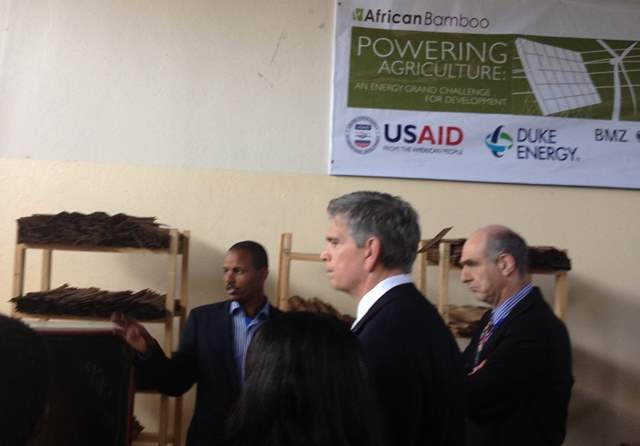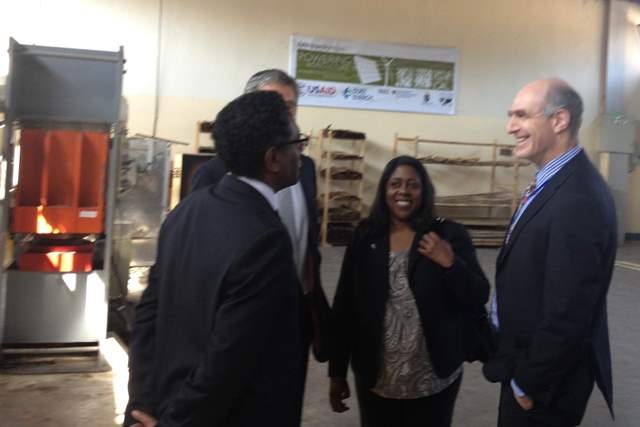Grants total $1.75 million USD from multi-donor Powering Agriculture and Agriculture Fast Track Funds
For Immediate Release

Addis Ababa - U.S. Agency for International Development (USAID) Associate Administrator Mark Feierstein announced the award of two grants to a start-up Ethiopian enterprise, African Bamboo, after touring the company’s testing facility. Mr. Feierstein was in Ethiopia as part of the official U.S. Government delegation to the African Union Summit in Addis Ababa.
African Bamboo is one of the 12 organizations awarded a Powering Agriculture grant supported jointly by USAID, U.S. Overseas Private Investment Corporation, Swedish and German governments, and Duke Energy. The awards support innovative projects aimed at integrating clean energy technology into the agriculture sectors of developing countries to increase production.
African Bamboo will use the grant of one million USD to develop and test a heating process to make industrial and commercial quality bamboo based on biofuel from organic waste, such as coffee husks and residue from processing the bamboo.
African Bamboo was awarded a second grant of nearly $750,000 from the African Development Bank Agriculture (AfDB) Fast Track Fund, supported by the United States, Sweden, and Denmark. The grant will help African Bamboo prepare feasibility studies and market analyses to attract investment capital and also to meet requirements for exports to the United States and the European Union.

Founder and General Manager Khalid Duri commented: "We are pleased to have been awarded the Powering Agriculture grant, and are especially proud to be the only African-owned business among the winners. This award will allow African Bamboo to continue our innovative work in renewable energy and agro-forestry processing, which we hope will benefit numerous agriculture value chains in Ethiopia."
Within Ethiopia, there are over one million hectares of bamboo, representing one of the largest reserves in Africa. Recognized as a fast-growing and largely sustainable raw material, there is an increasing global demand for bamboo as a wood substitute for a variety of construction and furnishing applications.
African Bamboo envisions developing a model that can lead to prospective business opportunities throughout the country for employment, manufacturing and export. In just its first phase, African Bamboo has entered into agreements for bamboo farming with over 30 cooperatives benefitting over 2,000 farmers in Sidama zone.
USAID’s Mark Feierstein explained how enterprises like African Bamboo illustrate the U.S. Government’s objectives to assist Ethiopia’s Growth and Transformation through public-private partnerships and, specifically, the U.S. Feed the Future and Power Africa initiatives.
“The African Bamboo enterprise is a good example of how adding value to farm products can be done to create new sources of income and food security for farmers and workers, sustain the environment, generate clean energy, and benefit the economy overall with earnings from new exports. I hope that this story of entrepreneurship and ingenuity will generate many more across Ethiopia and the region, inspire more cooperation across government, research and private sector entities, including members of the Ethiopian Diaspora.”
Press Release African Bamboo 1-31-14 [PDF, 27 KB]
Remarks Mark Feierstein African Bamboo 1-31-14 [PDF, 117 KB]
Related Resources
USAID Ethiopia: Agriculture and Food Security







Comment
Make a general inquiry or suggest an improvement.